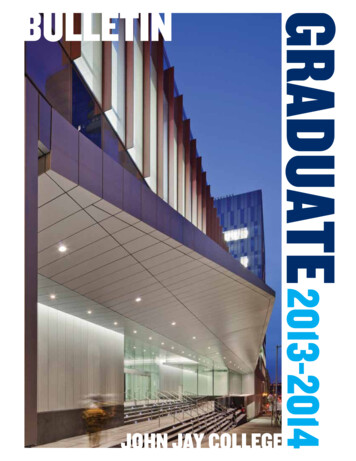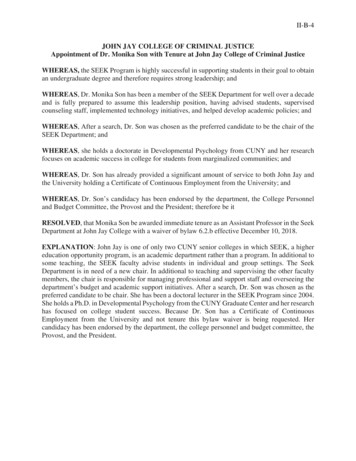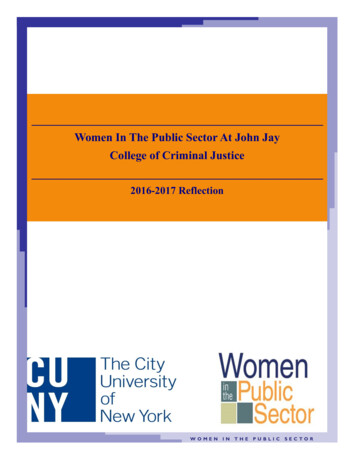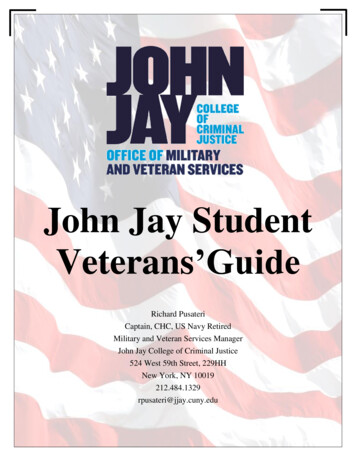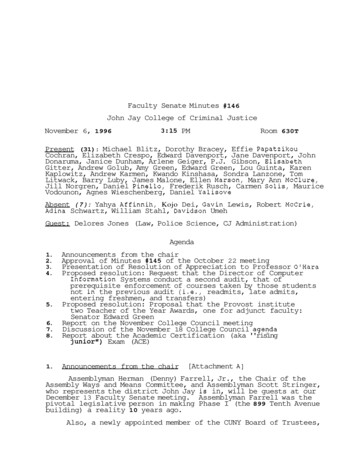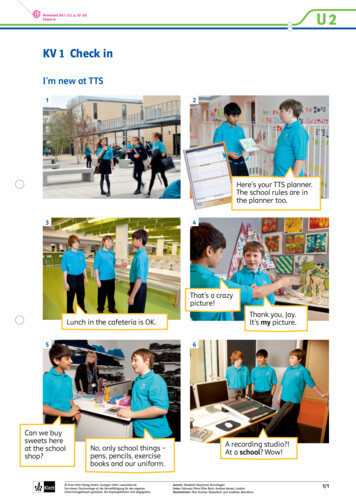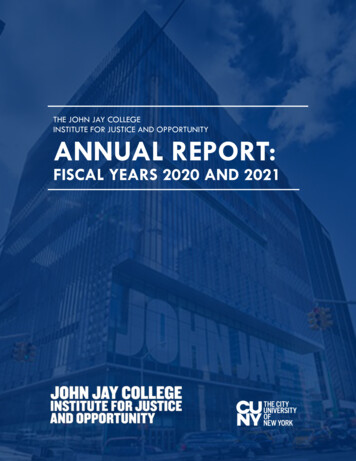
Transcription
THE JOHN JAY COLLEGEINSTITUTE FOR JUSTICE AND OPPORTUNITYANNUAL REPORT:FISCAL YEARS 2020 AND 2021John Jay College Institute for Justice and OpportunityAnnual Report 1
A center of research and action, the John Jay College Institute for Justiceand Opportunity creates opportunities for people to live successfullyin the community after involvement with the criminal legal system.Capitalizing on our position within the City University of New York (CUNY)and recognizing the transformational power of education, we focusmuch of our work on increasing access to higher education and careerpathways for people with conviction histories. We also invest in thedevelopment of professionals and systems that better serve the interestsof justice and opportunity for people who come into contact with thecriminal legal system. Our comprehensive and strategic approachincludes direct service, research, technical assistance, training, andpolicy advocacy.Please note that we use the phrase “criminal legal system” throughoutthis report rather than “criminal justice system.” Omitting the word“justice” reflects the growing acknowledgment that our systems ofcriminalization, policing, prosecution, and punishment are not always“just.” Instead, these systems more accurately involve legal practice, sowe adopt terminology that describes just that.John Jay College Institute for Justice and OpportunityAnnual Report 2
Letter from the Executive Director,Ann JacobsDear Friends:The John Jay College Institute of Justice and Opportunity is pleased to sharethis report on our activities over the last two fiscal years. This was an incrediblychallenging period, marked by the COVID-19 pandemic, political turmoil, andthe burgeoning demand for racial justice in response to the killings of GeorgeFloyd, Breonna Taylor, Ahmaud Arbery, and far too many others.The work of the Institute has always been to address the legacy of slaveryand systemic racism reflected in the disproportionate incarceration of peopleof color. Everything we do—our direct service, policy advocacy, and research—is grounded in eliminating barriers and creating pathways to opportunity forpeople who have been involved in the criminal legal system. We have alsocommitted ourselves to the self-examination and work needed to more fullyrealize ourselves as an anti-racist organization.Ann JacobsExecutive DirectorIn 2020, we celebrated our fifteenth anniversary by changing our name fromthe Prisoner Reentry Institute to the John Jay College Institute for Justice andOpportunity, a name that embraces possibility and better reflects the scopeof our work and values. We are proud to be a center of John Jay College, aninstitution committed to educating fierce advocates for justice, and part of theCity University of New York (CUNY), the largest urban public university systemand a transformative engine of social mobility, whose mission is to provide apublic first-rate education to all students, regardless of means or background.Consistent with the mission and values of John Jay and CUNY, the Institute buildspathways from corrections to CUNY; equips practitioners to excel in careers inhuman services, community justice and policy advocacy; and changes systemsto eliminate barriers and create access to opportunity.We center the voices of our students and directly impacted people in ourprojects, and we are honored to be part of a community of stakeholders equallycommitted to justice and opportunity. We create our projects in consultationand collaboration with our colleagues in government and non-profit agencies,CUNY, and other institutions of higher education. We seek to define the uniquecontribution that is ours to make and to identify opportunities to elevate,integrate, and complement the work of our colleagues to produce morecollective impact.We hope this report offers you a glimpse into our work and prompts you toconsider ways that, together, we can do more to achieve real justice andopportunity for people who have been denied. We thank you for your supportand partnership.Thank you,John Jay College Institute for Justice and OpportunityAnnual Report 3
AcknowledgmentsThe John JayCollege Institutefor Justice andOpportunitywould like toexpress oursincere gratitudefor the leadershipand support of:Félix V. Matos RodríguezChancellor, City University of New York (CUNY)José Luis CruzFormer Executive Vice Chancellor and UniversityProvost of CUNYRobert MarucaAssociate University Provost for Planning, CUNYKarol MasonPresident, John Jay College of Criminal JusticeYi LiProvost, John Jay College of Criminal JusticeAnthony CarpiAssociate Provost and Dean of Research,Professional Studies, and InternationalPartnerships, John Jay College of Criminal JusticeJohn Jay College Institute for Justice and OpportunityAnnual Report 4
Félix V. Matos RodríguezCUNY Chancellor“CUNY’s mission is to provide high quality education to all NewYorkers, regardless of background or means, and to alloweveryone to share in their piece of the American dream. TheJohn Jay College Institute for Justice and Opportunity’s CollegeInitiative program is an important extension of this mission to makesure that everyone has an opportunity to live a well-rounded,prosperous life. To truly reach all New Yorkers and to ensure themost vulnerable among us aren’t left behind, it is imperative thatwe actively engage those who have been impacted by the legalsystem, which, as we know, disproportionately effects communitiesof color. Higher education is more than a vehicle for upward socialmobility; it is also the best way we have to undo the harm causedby decades of misguided policies and practices that have resultedin our current state of mass incarceration.”“One our most overlooked populations is those students who havebeen incarcerated. It is no secret that the United States’ criminallegal system is rife with prejudice, and those who have been at themercy of this inequitable system find walls erected before themas they pursue an education in an effort to better themselves andcontribute to their community. In my view, it is nothing less than theduty of higher education to tear down those walls and offer asecond chance to anyone who seeks it.”José Luis CruzFormer CUNY Executive ViceChancellor and University Provost“I am proud that the John Jay College Institute for Justice andOpportunity has operated the College Initiative since 2015—to support individuals with legal system involvement enrollingand succeeding in college. And the Institute is spearheadingwork across the CUNY network to make all CUNY schools moreaccessible and equitable for system-impacted students.”Karol V. MasonJohn Jay College PresidentJohn Jay College Institute for Justice and OpportunityAnnual Report 5
Table of Contents07Building Pathways from Corrections to CUNY07070909Outreach in Correctional FacilitiesCollege Readiness at RikersPrison-to-College PipelineCollege Initiative Supportive Services Peer Mentoring Legal Support10 HSE (High School Equivalency) Connect11Equipping Practitioners to Excel in Careers in Human Services,Community Justice and Policy Advocacy11 Fellowships Pinkerton Fellowship Initiative Tow Policy Advocacy Fellowship David Rockefeller Fund Fellowship13 Professional Studies Certificate Programs Navigator Certificate in Human Services and Community Justice Collective Leadership Supervisor Training Tech 101: Introduction to Technology for the Workplace15Changing Systems and Creating Access to Opportunity15 Eliminating Barriers and Expanding Access to Housing Fair Chance for Housing NYC Housing Authority (NYCHA) Airbnb16 Eliminating Barriers and Expanding Access to Education and Employment CUNY Justice Learning Collaborative17 Creating More Comprehensive and Integrated Systems of College In and After Prison Mapping the Landscape of Higher Education in New York State Prisons Technical Assistance on Reentry Planning for College-in-Prison Programs Creating a Robust Community of College-in-Prison Provider18 Developing Resources and Toolkits The New York State Back to School Guide Resource Guide: Reentry and College Access Organizations Reflections on Building a Partnership with Corrections19Student Financial Assistance Fund20Funders21Staff and Acknowledgments22Finance StatementsJohn Jay College Institute for Justice and OpportunityAnnual Report 6
BUILDING PATHWAYS FROMCORRECTIONS TO CUNYThe Institute provides a continuum of services within correctional facilities and in the community thatengages with system-impacted people wherever they are in their academic journey,connecting them to programs at CUNY and services within New York City.Outreach in CorrectionalFacilitiesWe communicate with incarcerated individualsinterested in pursuing higher education through writtencorrespondence, in-person outreach at facilities, andupon referral from other organizations. Some areseeking to return to college after some time and othersare contemplating enrollment for the first time. In thewake of COVID-19, we paused in-person outreachand relied on referrals from partner organizations andcorrespondence to connect with individuals interestedin utilizing our services.Prison-to-College PipelineFounded in 2011, the Prison-to-College Pipeline(P2CP) is CUNY’s college-in-prison program at OtisvilleCorrectional Facility in Orange County, NY, which isabout 90 minutes away from John Jay’s Manhattancampus. P2CP enrolls roughly 55 students a semesterin accredited liberal arts courses designed to fulfillCUNY’s general education requirements and preparesstudents to continue their degrees in the community.213 students have enrolled in P2CP at Otisville since2011. In fiscal years 2019-20 and 2020-21, the Institutecorresponded with approximately 300 incarceratedindividuals.College Readiness atRikers IslandRealizing the opportunity for people to jumpstart theircollege careers while serving their sentence at Rikers,the Institute started offering college preparation classesthere in 2017. In 2019, we partnered with CUNY’sBorough of Manhattan Community College to teach twocredit-bearing classes in the jail—Critical Thinking 100and Critical Thinking 120. The third semester of classwas interrupted by the outbreak of COVID-19 and wascompleted remotely. A total of 35 students completedcredit-bearing courses at Rikers Island before we wereforced to suspend classes due to COVID-19.Although currently suspended due toCOVID-19, the Learning Exchange bringsstudents from John Jay’s Manhattancampus to the prison for monthly seminarswith Otisville students on a range of topicstaught by faculty across CUNY. Over 100students from John Jay’s Manhattancampus have participated in the LearningExchange since 2011.Among alumni who have been released,14 are now enrolled in college in thecommunity, and 8 have already earneddegrees while in the community. Many ofthese graduates are now working on theirsecond and third academic degrees.John Jay College Institute for Justice and OpportunityAnnual Report 7
Professor Jessica Gordon-Nembhard teaching Africana Studies 121 at Otisville Correctional Facility. (Photo credit: Amber Gray.)Prison-to-College Pipeline: Adapting for the Present and FutureBuilding a Computer LabOne of the biggest challenges to providing college-inprison is the lack of access to technology and researchresources for incarcerated students. Unlike traditionalcollege students, incarcerated students cannot accessthe internet or have ready access to computers. In2020 we installed a larger and substantially updatedcomputer lab with updated computers with skill-buildingsoftware and library resources.In a typical semester, the P2CP courseofferings include:Course #Course TitleFrequencyENG 101Composition ITwo sectionsSOC 101Introduction to SociologyTwo sectionsSOC 104Tabloid JusticeOne sectionLIT 327Crime, Punishment, andJustice in World LiteraturesOne sectionLIT 106Introduction to FilmOne sectionDRA 213Acting IOne sectionURG 280Learning ExchangeMonthly, year longEquipping Classrooms withVideoconferencing EquipmentIn response to the COVID-19 outbreak, we immediatelyshifted to a distance education model, as we workedwith the Department of Corrections and CommunitySupervision (DOCCS) to temporarily re-purposevideoconferencing equipment at Otisville for academicpurposes. We then obtained private funding to purchaseand install additional videoconferencing equipment atOtisville to connect with students and facilitate classesremotely during the COVID-19 pandemic. The equipmenthas enabled us to increase contact between professorsand students, offer “office hours,” provide academiccounseling, conduct reentry planning, and facilitateother components of a traditional college-in-prisonprogram remotely. Looking forward, this equipment willenable us to host guest lecturers from around the world,provide additional small group and one-on-one support,and generally bridge the distance between our staff andstudents.From an initial class of 14 students in 2011,by the 2019-2020 academic year, P2CP hadgrown to 55 students per semester with anaverage GPA of 3.6.John Jay College Institute for Justice and OpportunityAnnual Report 8
Our largest program, College Initiative (CI), assistsstudents who have been involved in the criminal legalsystem in applying to, enrolling in, and succeedingin colleges across CUNY, within SUNY, as well as atseveral private schools in the metropolitan area. Ourmodel includes academic counseling, peer mentoring,community engagement, and wraparound supportservices. CI is a community of enrolled students,aspiring students, and alumni, who support andencourage each other through peer mentoring andalumni activities.Following the outbreak of COVID-19, CI staff increasedsupports to students struggling with the transition toonline learning—including personally delivering tabletsto students, offering additional tutoring and technicalassistance, and helping students apply for financialassistance in the wake of the pandemic. We werefortunate to receive emergency assistance grantsfrom foundations and individuals which enabled us toprovide direct financial assistance as well.LEGAL SUPPORTCollege InitiativeThe Institute provides civil legal servicesto students through a partnership with theCommunity Service Society of New York (CSS). ACSS attorney is on-site at the Institute three daysa week, working closely with Institute staff toensure that students know their rights, especiallyas it relates to access to housing, employment,and education. She also helps students correctdamaging errors on their criminal histories (RAPsheet), apply for clemency, certificates of reliefand of disability. In fiscal years 2020 and 2021, the CSSattorney provided over 700 legal services(such as support correcting errors on RAPsheets or applying for Certificates of Relieffrom Disabilities or Certificates of GoodConduct) to Institute participants SUPPORTIVE SERVICES: The Institute’s Intakeand Supportive Services unit makes initialcontact with all new CI participants to conduct anassessment and addresses their non-academicneeds. In fiscal years 2019-20 and 2020-21, theSupportive Services Unit worked closely with 200CI participants on non-academic needs, such ashousing, employment, benefits, and health. PEER MENTORING AND ALUMNI NETWORK:CI students encounter unique obstacles thatmost traditional college students do not—suchas juggling classes with probation or parolerequirements. CI’s mentoring program stipendsmore experienced students to serve as mentorsfor first-year students. Mentors offer new studentsguidance on everyday issues, like connectingwith tutoring services on campus, as well asmore complex ones, like choosing whether or notto disclose their past legal system involvementin class. Research shows that peer mentoringincreases retention and persistence throughcollege and that completion of the first year ofcollege leads to much higher graduation rates. In the 2019-20 and 2020-21 academic years, wetrained 56 experienced CI students to serve asmentors. These mentors provided guidance andsupport to 118 new CI students (as mentors canhave more than one mentee).Carlos Quintana, former Director of College Access, hosting the 2020 College Initiativevirtual graduation ceremony on Zoom.Every spring, the College Initiative community comestogether to celebrate its members who have earneda degree. In June 2020 and 2021, we celebrated ourgraduates via Zoom due to COVID-19. Between thetwo virtual events, we recognized 43 members of theCI community who completed post-secondary degreesat 22 different CUNY, SUNY, and private institutions. Inthe 2019-20 and 2020-21 academic years, CI reesJohn Jay College Institute for Justice and Opportunity9master’sdegreesAnnual Report 9
Since CI became part of the Institute’s continuumof services in 2015, CI students have earned a totalof 488 degrees from 20 different CUNY colleges, asdetailed below:14423461732014404332265267242410821Our Students,By the NumbersCI Students Enrolled in theFall 2020 Semester:Baruch College84%transfer studentsBronx Community College61%previously incarcerated for over a yearBrooklyn College9.5average length of incarcerationCollege of Staten Island45%on probation or paroleCUNY Graduate Center82%identify as Black or LatinxCUNY School of Law68%identify as menCUNY School of Professional Studies61%reported being unemployed at intake93%reported receiving some form ofpublic assistance42average ageBorough of Manhattan CommunityCollegeCity College of New YorkHostos Community CollegeHunter CollegeJohn Jay CollegeKingsborough Community CollegeLaGuardia Community CollegeLehman CollegeMedgar Evers CollegeNew York City College of TechnologyQueens CollegeQueensborough Community CollegeYork CollegeyearsHSE ConnectWe launched HSE Connect in 2020 to fill thegap in available programs for adults who areinterested in college but still need their highschool equivalency (HSE). Most HSE programmingis designed for youth, so we partnered with theManhattan Educational Opportunity Center tocreate an educational pathway for adults over theage of 25. Students who complete HSE Connectwill be assisted in enrolling in college by CollegeInitiative.Although HSE Connect launched after theoutbreak of COVID-19 and has operated remotelysince then, 60 people have completed theInstitute’s intake process and 42 have enrolled inclasses with MEOC.John Jay College Institute for Justice and OpportunityAnnual Report 10
EQUIPPING PRACTITIONERS TO EXCEL INHUMAN SERVICES, COMMUNITY JUSTICE,AND POLICY ADVOCACY CAREERSOur Career Pathways programs offer a range of educational and training opportunities to support theprofessional development of both students and more seasoned employees who seek employmentand advancement in the fields of youth justice, human services, community justice, policy advocacy,and philanthropy. Our fellowships and certificate programs combine academic study with servicelearning and skills development.FellowshipsThree major foundations fund the Institute to offerrobust fellowship initiatives that combine long-terminternship placements at non-profit organizationswith academic study and professional enrichment totrain the next generation of leaders in youth justice,policy advocacy, and philanthropy. Fellowships providestudents with financial assistance in the form of tuitionremission or generous stipends, a transportationallowance, and an opportunity grant for books,computers, or other personal expenses. Internship hostsites also receive access to training and support fromthe Institute.In response to COVID-19, the Institute’s Fellowshipstaff reconceived and launched an entirely webbased cohort—operating the orientation, class, hostsite placements, and other professional developmentopportunities virtually. This year, our Fellows metthe increased need of our host sites—many of whomexperience budget cuts—by taking on additionalresponsibility and making invaluable contributions totheir host agencies.The Pinkerton Fellowship InitiativeUndergraduate students selected to be PinkertonFellows are placed for 12-15 months at local nonprofitorganizations that serve system-involved youth. In theirvarious roles, fellows expand operational capacity andbring new ideas, perspectives, and enthusiasm to theirhost organizations.In the 2019-20 Pinkerton Fellowship cohort,nineteen Pinkerton Fellows contributed nearly20,000 hours of work to their host sites.“”Host Site Feedback:At BronxConnect we have seenYasmeen adapt to a complex workenvironment with many moving parts.The organization has benefited fromPinkerton Fellows by having wellvetted interns that have a greatsupport system. Yasmeen has beeninstrumental at serving as an assistantto a case manager. In the process,she is able to learn all aspect of casemanagement. In addition, becausePinkerton has such an impressiveprocess of selecting qualified internslike Yasmeen, we are able to placethem in substantive roles.Jose MarteProgram ManagerBronxConnectJohn JayJay CollegeCollege InstituteInstitute forfor JusticeJustice andand OpportunityOpportunityJohnAnnual ReportReport 1111Annual
The Tow Policy Advocacy FellowshipGraduate student Tow Fellows gain intensive onthe-ground experience in policy advocacy, whilesupporting the work of host sites to make systemicchange in the world. Tow Fellows conduct research,track legislation, and organize constituents in orderto support their host sites’ advocacy agenda whilegaining the experience and skills needed to becomeeffective policy advocates themselves. In a typical academic year, Tow Fellowscontribute over 3,000 hours to their host sites’advocacy agendas—by conducting research,tracking legislation, organizing constituents, andso forth. Over the course of the 2020-21 academicyear, Abigail Ramos contributed to the OsborneAssociation’s advocacy efforts to advanceA.4250-A/S.2841-A, a bill to protect in-personvisitations at correctional facilities. The StateSenate passed the bill in May 2021, and asof this publication, the Osborne Association isworking toward getting the bill passed in theAssembly and signed into law.The David Rockefeller Fund (DRF)FellowshipDesigned specifically to bring people with ‘livedexperience in the criminal legal system’ intophilanthropy, the DRF Fellowship immerses twofellows a year in the worlds of philanthropy and legalsystem reform. At DRF, Fellows assist with grantsadministration and daily operations. They bring theirunique perspectives to the causes the DRF works toaddress, while also gaining hands-on experience andbuilding the skills and knowledge needed to work in thefield of philanthropy. DRF Fellows complete additionalprofessional development activities to complementtheir on-the-ground learning and to solidify their postFellowship plans. Fellows also participate in DRF boardmeetings and typically make a presentation on whatthey have learned and accomplished to the foundationand the Institute at the culmination of their fellowship. To date, nine individuals have participated in the DRFFellowship. Three Fellows helped launch the CanaryFund—an independent grantmaking body—which received 200,000 from the DRF Board to distribute.“”Host Site Feedback:Maya has contributed so much! Hercourt observation work has beenfantastic. She’s also a really valuablemember of the team, especiallybecause she’s so grounded andinsightful. She provided substantivefeedback on our policy brief onemerging adults that made it better.And she is helping our CommunityAdvocate plan a session on policyreform for our Youth Speakers Institute.Kate RubinDirector of Policy & Strategic InitiativesYouth RepresentJohn Jay College Institute for Justice and OpportunityAnnual Report 12
Professional Studies Certificate ProgramsBridging the worlds of workforce development, higher education, and criminal legal reform, our certificateprograms prepare people for successful careers in human services and community justice. In consultationwith employers, peers, and directly impacted individuals, we designed three programs to increase pathwaysfor people with lived experience in the criminal legal system to obtain and advance employment in the humanservices field: the Navigator Certificate in Human Services and Community Justice, Collective LeadershipSupervisor Training, and Tech 101. Across these programs, the Institute’s Career Pathways unit trains 150people a year. Our Career Pathways division utilizes the principles of adult learning and evidence-basedstrategies to build individual and organizational capacity to better serve people with criminal legal systeminvolvement. To boost workplace success, participants develop crucial employability skills identified by nonprofit and government employers.Navigator Certificate in Human Servicesand Community Justice The Institute launched its third cohort of theNavigator Certificate in early 2020. Followingthe outbreak of COVID-19, Institute staff initiallydeveloped a series of non-credit-bearing workshopsfor Navigator students to maintain some senseof community and to begin honing the tech skillsneeded to participate in a virtual class—particularlyas Navigator students are older than traditionalcollege students and less comfortable withtechnology due to prior periods of incarceration. The Institute launched its first fully web-basedNavigator Certificate cohort in the Fall of 2020—replicating some elements on the in-person classremotely, while also introducing new supports, suchas optional Saturday morning study sessions, tohelp students adapt to the virtual format.STUDENT PROFILEA one-semester program offered in partnership withJohn Jay College’s Professional Studies, the NavigatorCertificate prepares people with lived experience in thejustice system to gain employment or earn promotionsin the human services field. Graduates of the programwho enroll at John Jay earn six credits toward a degree.Frank* served nearly 20 years in prison and wasreleased in 2017. He participated in the firstNavigator Certificate cohort in 2019. At the time, hewas working as a paralegal at a law firm, but he wasinterested in transitioning to a career that drawsupon his lived experience and involves giving backto the community. After he completed the NavigatorCertificate, Frank secured a job as a co-trainerwith one of the Navigator Certificate instructorsto provide sessions in the Social ResilienceModel (SRM), a neuroscience-based approachto improving individual and group well-being andresilience. In 2020, Frank also launched a nonprofitorganization that provides reentry and supportservices for formerly-incarcerated individuals, whilecontinuing to work as an SRM trainer.* Name changed to protect his privacy. In the first four cohorts, 66 students completedthe Navigator Certification course. After completingcollege-level course work for the NavigatorCertificate, 22 students also connected withCollege Initiative for assistance continuing theireducations. We are currently building a robustalumni group engaged through surveys, focusgroups, and email blasts to provide job leads,training opportunities, and other assistance.John Jay College Institute for Justice and OpportunityAnnual Report 13
The landscape of criminal legal services in New York Cityis being transformed as more people are hired who havelife experience like the program participants they areserving—that is, they have been involved in the criminallegal system, substance use treatment and mentalhealth systems. Targeted supervisory training builds asupportive organizational culture as agencies seek tohire and retain more employees in navigator, mentor,and other peer and credible messenger positions, andas they seek to promote supervisors and managers withlived experience.In response to needs identified by employers andemployees, the Institute launched the CollectiveLeadership Supervisor Training (CLST), a 21-hourcertificate course on supervisory practices that developinitiative and leadership in all staff. The trainingincreases supervisors’ capacity to convey workplaceexpectations and performance feedback, build theirtrauma-informed supervision practices, and developa “collective leadership” approach that makes spacefor initiative and leadership by employees at all levels.Designed as a practicum, the training sessions arespread over two to three months, giving supervisorstime to practice skills, report back to the class abouttheir experiences, and receive additional coaching todeepen their skills.The Institute has trained 164 supervisors in six cohortsover the last two years, building supervisory capacityacross the spectrum of human services from youthjustice and reentry to behavioral health, housing, andemployment programs. About one-third of participatingsupervisors report that they are directly impacted by thecriminal legal system and another twenty-five percentreport that they have immediate family members whoare directly impacted.CLST FEEDBACKCollective Leadership SupervisorTraining (CLST)In post-training surveys, participantsdescribed the training as follows: “Life-changing and transformative many of my reflex practices are nowbeing revamped.” “I now have the tools to actuallycultivate the leadership skills ofmy supervisees rather than havingthem rely on me for direction I’mmuch more conscious of how I cando better about creating leadershipculture.” “I am committed to hiring individualswith lived experience and now feelbetter prepared to offer the supportand structure to set any employeefrom any background up for success.”We also surveyed the managers of CLSTattendees, who described their employees asfollows: “More self-reflective” “More open to feedback” “Showing improved adaptability andagility to switch gears when needed” “Improved ability to communicateand engage with staff beyond directreports”Tech 101: Introduction to Technologyfor the WorkplacePeople who have lost years to incarceration are oftenat an extreme disadvantage getting and performingon
Partnerships, John Jay College of Criminal Justice . John Jay College Institute for Justice and Opportunity Annual Report 5 . Félix V. Matos Rodríguez CUNY Chancellor . Borough of Manhattan Community College to teach two credit-bearing classes in the jail—Critical Thinking 100 and Critical Thinking 120. The third semester of class



